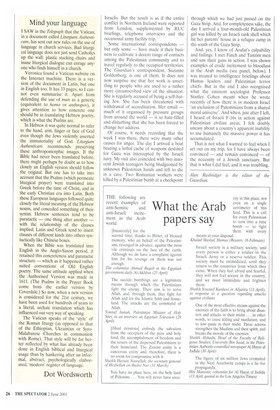Mind your language
I SAW in the Telegraph that the Vatican, in a document called Litutgiam Authenticam, has sent out new rules on the use of language in church services. Bad liturgical language does not just send Catholics up the wall; plastic stacking chairs and inane liturgical dialogue can enrage anyone who finds himself in a church.
Veronica found a Vatican website on the Internet machine. There is a version of the document in Latin, but one in English too. It has 33 pages, so I cannot even summarise it. Apart from defending the use of man as a generic (equivalent to homo or anthropos), it gives attention to how concrete one should be in translating Hebrew poetry, which is what the Psalms are.
In Hebrew it was quite normal to refer to the hand, arm, finger or face of God even though the Jews violently asserted the immateriality of God. Liturgiam Authenticam recommends preserving these anthropomorphic images. If the Bible had never been translated before, there might perhaps be doubt as to how closely an English version should follow the original. But one has to take into account that the Psalms (which permeate liturgical prayer) were translated into Greek before the time of Christ, and in the early Christian era into Latin. Both these European languages followed quite closely the literal meaning of the Hebrew nouns, and conceded something of their syntax. Hebrew sentences tend to be paratactic — one thing after another — with the relationship of the clauses implied; Latin and Greek tend to insert clauses of different kinds into others syntactically like Chinese boxes.
When the Bible was translated into English in the Anglo-Saxon period, it retained this concreteness and paratactic structure — which as it happened rather suited conventions of Old English poetry. The same attitude applied when the Authorised Version was made in 1611. (The Psalms in the Prayer Book come from the earlier version by Coverdale.) So now, when a new version is considered for the 21st century, we have been used for hundreds of years to a literal, archaic translation which has influenced our very way of speaking.
The Vatican speaks of the 'style' of the Roman liturgy (as opposed to that of the Ethiopian, Ukrainian or SyroMalabarese Churches in communion with Rome). That style will be far better reflected by what has already been done in English biblical and liturgical usage than by hankering after an informal, abstract, psychologically elaborated, 'modern' register of language.
Dot Wordsworth










































































 Previous page
Previous page